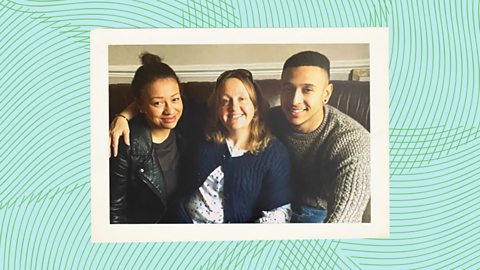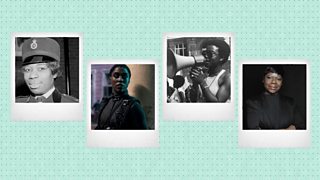Dealing with the loss of a parent when you’re young: Two women share their advice
Every one of us will have to deal with bereavement and grief at some point in our lives, whether it’s the loss of a close friend or a family member. But it can be particularly difficult to lose one of your parents at a young age.
����ý Radio 4 Woman’s Hour spoke to two young women who’ve used their experiences of grief to help others navigate losing a loved one. Here they share their stories and some of the biggest lessons they’ve learned…

Amber’s story
Amber Jeffrey is the founder and host of The Grief Gang podcast and was just 19 when her Mum died.
I'm grieving not only for the loss of my mum, but for what should have been.Amber
“Five years ago I lost my lovely mum, Sue Valentine, to a very sudden heart attack. She was here one day, and gone the next. It was my first ever bereavement. I'd never experienced a loss on that scale before.
“It just absolutely rocked my world and my older brother’s world, and we were catapulted into this world of navigating a life without Mum. I was freshly 19. I didn't know what I wanted to do career-wise. I didn't even know how to use a washing machine. I remember doing my first washing load after Mum died and looking at the washing machine and going: ‘Oh my God, how on earth do I use this?’ It completely turned my world upside down.
“When I would speak with older people in my life, they would say they know how I feel as they lost their Mum too. But they lost a parent maybe in their 40s or 50s, so not to disrespect or disregard them, but they had 20 years more than me. Their Mums got to see them get married and have babies and hold their children.
“I'm grieving not only for the loss of my mum, but for what should have been. Not just for me, but what should have been for my mum too. My mum lost out on so much. Being young and bereaved, you have to acknowledge that those future milestones will be really hard, but you cross that bridge when you get to it.”

‘When you’re young and bereaved, you’re stripped of so much’
Amber Jeffrey on her grief after losing her mum aged 19.
Helen's Story
Helen Smith was 31 when her Dad died from Covid-19, and she now runs an Instagram page called Lockdown Grief.
The word that I use to describe it over and over is surreal, completely and utterly surreal. It completely shattered me.Helen
“I lost my Dad, Ian, on the 12th of April 2020. So it was at the start of the first wave and it was to Covid-19. He was 73 years old. Not that I feel it's relevant, but he had no underlying health issues, because that’s unfortunately one of the first questions people ask you with a loss during the pandemic.
“My dad was my best friend. We were a very, very close knit family unit. It was very quick. And to this day, the word that I use to describe it over and over is surreal, completely and utterly surreal. It completely shattered me.
“It's only since Dad died that so many people have been saying they used to love seeing our bond, seeing pictures of us together, seeing the silly videos we used to share. That actually made me sit back and think that I'm so incredibly lucky because not everybody does have that close relationship. But for me, losing my dad and losing that relationship has had a profound effect on me.
“I was furloughed from work, which was a blessing in disguise actually, so we relocated to go and stay with my Mum because she had been left alone, having seen my dad get whisked away in an ambulance, so of course she was my top priority. I just couldn't bear the thought of her now having to live alone, having dealt with this trauma and this sudden loss of her husband.”
Research by Marie Curie has revealed that around half of people in the UK think we don’t talk enough about death and dying as a society. So, how can we remove the stigma around speaking about loss and deal with feelings of grief?
1. Remember it will get easier
“In those early weeks and those early months, it touches everything in your life,” says Amber. “It digs its claws into everything. And it just engulfs everything. You often look and think, ‘there will never be a time in my life where it won’t be the first thing on my mind when I wake up in the morning’. But one day, it won't be the first thing on your mind. You might think; ‘What does that mean? Am I forgetting them? Does that mean I don't miss them anymore? Does that mean I don't love them as much?’ Not at all.
“We adjust. We persevere. We mould with our grief. We adapt with it. So for people who are in the early throes of it and thinking ‘there is no way out of this really dark hole’, there is. And there are other people out there who get it.”
2. Be kind to yourself
“Don't be so hard on yourself,” says Helen. “Grief is an ongoing, lifelong process that constantly ebbs and flows, shifts and changes, and can manifest itself in so many different ways. One day you may be barely aware that it's there; another day you might feel completely overwhelmed and exhausted.
“Contrary to popular belief, you don't wake up one day and magically stop grieving. No matter how long it's been, if you're having a day where it's weighing particularly heavily on your shoulders, give yourself grace and validation that that's okay, and try to embrace it.”

3. Talk to someone
“Being able to have these open and honest conversations around grief and loss is so incredibly important,” says Helen. “As a country, we just clam up and don't talk about things that are difficult. We'd rather push them to the side and not have to worry about it until it happens to you. But the thing is, with death, it will happen to everybody, and it will touch you at some point in your life.
“We really need to make it the norm to talk about death and dying, and to talk about our wishes once we die, and to talk about grief because it is life changing. Don't be afraid to communicate with those closest to you about what helps or doesn't help you in your grief. Quite often people genuinely want to help you, but don't know how.
“This can sometimes lead to them treading on eggshells around you for fear of upsetting you further, or using unhelpful platitudes which most grievers find even more hurtful. However, if you actually say to those around you: ‘I actually love it when you talk to me about my person’, or, ‘I find it quite triggering to talk about X,Y and Z’, that will help them better understand how to support you as an individual.”
4. Learn to live with your grief
“Grief is a constant journey,” says Amber. “It's a constant project that you will forever be working on. I think that can sound really daunting because sometimes we can be told by society that there's a time frame on grief and to ‘give it a couple of years and you'll be alright’. The cold, hard pill of it is, this is for life.
You don't need to ‘get over’ your grief, you need to learn to live alongside it, and that is a major difference.Helen
“I used to find that very daunting. But very early on in my bereavement I read that ‘grief is love with nowhere to go’. So when you feel in the deepest, darkest depths of your grief, remember at the centre of it all, the crux of it, is all the love you have for your person.”
“The notion that you need to ‘get over’ your grief is not only damaging and detrimental, but untrue too,” says Helen. “Grief is the final act of love, so for me, ‘getting over it’ insinuates that I'm expected to stop loving my person, which is never going to happen.
“A better way to reframe this cliché is to understand that you don't need to ‘get over’ your grief, you need to learn to live alongside it, and that is a major difference.”

5. Do what you need to do
"Never let anyone dictate to you how you should or shouldn't be grieving,” says Helen. “There is no right or wrong way to grieve. Everybody's grief is individual to them, and how they manage their grief is individual also. Do whatever it is you feel you need to do to help your grief feel a little lighter (as long as it's not detrimental to your own health), and if anyone judges you, ignore them.”
“Find your people,” says Amber. “There are people out there who do get it and want to support you. You're not an alien and you don't have to experience this alone. It can be tricky to find those people, but when you do it'll feel like you've hit gold.”
For more information and support, visit the links below:
Listen to the full discussion on ����ý Sounds, where you can also catch up on any episodes you may have missed. Or join the conversation @bbcwomanshour on and .




